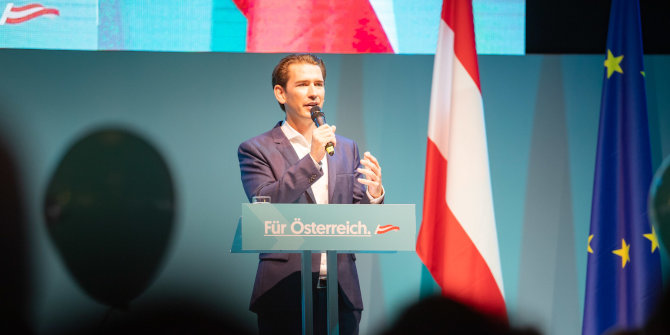 Both the 2017 German and Austrian elections saw large vote shares go to radical right-wing populist parties in the shape of the AfD in Germany and the FPÖ in Austria. But as Alex Jarman writes, the response of Angela Merkel to the challenge posed by the AfD was notably different from how Sebastian Kurz addressed the FPÖ in Austria. He argues that by adopting a radical approach on immigration, Kurz may have found a short-term solution to stop the FPÖ from driving Austrian politics, but Merkel’s approach may ultimately prove to be more beneficial in the long-term.
Both the 2017 German and Austrian elections saw large vote shares go to radical right-wing populist parties in the shape of the AfD in Germany and the FPÖ in Austria. But as Alex Jarman writes, the response of Angela Merkel to the challenge posed by the AfD was notably different from how Sebastian Kurz addressed the FPÖ in Austria. He argues that by adopting a radical approach on immigration, Kurz may have found a short-term solution to stop the FPÖ from driving Austrian politics, but Merkel’s approach may ultimately prove to be more beneficial in the long-term.

Sebastian Kurz, Credit: Franz Johann Morgenbesser (CC BY-NC-SA 2.0)
Over the past month, strong electoral performances by radical right-wing populist parties have rattled Austria and Germany’s political systems. Austria’s Freedom Party (FPÖ) took second place with 27.4 per cent of the vote on 15 October and stands a good chance of becoming the junior coalition partner of the centre-right Austrian People’s Party (ÖVP) while Germany’s Alternative für Deutschland (AfD) won 12.6 per cent of the vote and is now the third strongest party in the Bundestag.
The two countries’ mainstream political parties have adopted different strategies to manage the surge in popularity of these parties. The ÖVP has responded in a way that has muted the FPÖ in the short term but risks a greater influence of radical right-wing populism on the country’s politics in the long term. Angela Merkel and her Christian Democratic Union (CDU), meanwhile, are risking more in the short term in the hope of limiting the long-term impact of radical right-wing populism on German politics.
Sebastian Kurz needed to change the ÖVP’s strategy when he took control of the party in May. At the time, the FPÖ led both the ÖVP and the centre-left Social Democratic Party in the polls. Kurz responded to this challenge by moving his party sharply to the right. The ÖVP adopted positions on migration that mimicked policies originally drafted by the FPÖ, much to the FPÖ’s annoyance. The ÖVP took further cues from the FPÖ and other populist campaigns by focusing on Kurz’s persona, renaming the party “Liste Sebastian Kurz – die neue Völkspartei,” and emphasising his connection to everyday Austrians’ interests.
This strategy quickly paid off. Before May, few would have believed the ÖVP would win the election by 4 percentage points. Another factor behind Kurz’s win was the removal of the FPÖ’s dominance of the migration issue. In past elections, the FPÖ’s radical positions drove the conversation on migration. With the ÖVP drawing from the FPÖ’s policy proposals, however, the FPÖ was no longer driving the conversation on migration. Kurz reduced the FPÖ to complaining that they would be the best party to implement their original ideas. By election day, the FPÖ had faded to the background behind the ÖVP’s charismatic new leader.
The ÖVP likely will not enjoy these benefits for long. Decimated in the mid-2000s after playing second fiddle to the ÖVP in Wolfgang Schüssel’s government, the FPÖ will not be as tame a coalition partner this time around. The party understands what happens when it is a quiet coalition partner that doesn’t question its partner. Thus, while it may have been uncharacteristically quiet during the campaign, it will likely be more disruptive in the next government. Kurz may have found a short-term solution to stop the FPÖ from driving Austrian politics, but this is only a stop-gap measure.
Furthermore, Kurz’s actions do not address the underlying factors fuelling radical right-wing populism in Austria. While Kurz has reduced the FPÖ’s prominence in the short term, he has also brought radical right-wing populist ideas into the mainstream of Austrian politics. This action will not easily be undone, and future populists will be able to take advantage of it to bring more instability to Austrian politics.
Germany, meanwhile, has taken the opposite approach. It faces greater risks from radical right-wing populists in the short term but is less likely to see a long-term populist impact on its political system. The AfD’s position in the Bundestag gives it numerous options to continue to spread its “us vs. them” message. The AfD’s nomination of Albrecht Glaser as a vice president of the Bundestag exemplifies the greatest risk of the German strategy for managing the AfD.
The AfD knows that playing the provocateur in the Bundestag will force more mainstream German politicians to denounce the party and its policies. Nominating Glaser, who has argued that Muslims should lose their right to freedom of religion, to be a vice president of the Bundestag prompted condemnation from all other parties in the Bundestag. The AfD leadership knew this would happen and that they would be able to use the condemnation to support their message that they and their voters are victims of Germany’s political elite.
More provocations like Glaser’s nomination are certain to follow. These actions will allow the AfD to operate in a permanent campaign mode in the Bundestag, as it has in German state parliaments. By continuing its current path, mainstream German political parties risk providing fuel for the AfD to rise even higher in the next polls.
Should the German mainstream be able to hold for the next few years, however, it stands to benefit in the long term. The AfD is already degenerating into internal chaos. Frauke Petry, the party’s former chairwoman, announced the day after the election that she would not sit with the AfD in the Bundestag and would leave the party. Numerous other AfD representatives have followed her example since the announcement. With a bit of patience, the AfD may well fade into the background of German politics, victim to the phenomenon of protest parties being unable to gain momentum once elected into government.
Relegating the AfD to the background of German politics will not solve the problem of right-wing populism in Germany, but it will give Germany’s mainstream parties time to regain their lost voters. Some 60 percent of AfD voters chose the party to protest against Germany’s other parties and not out of genuine support for the party’s programme. If mainstream German parties are able to demonstrate they recognise these voters’ concerns while defending the benefits of liberal democracy, they will remove populists’ competitive advantage. Furthermore, without having adopted populist communication strategies and radical right positions as the ÖVP has done, the German political system will be less susceptible to future threats from radical right-wing populism.
It is still early days after both Germany and Austria’s elections. Yet both countries may have already chosen their paths for the coming years. Austria has seen its traditional right-wing populist party defeated in the short term by Sebastian Kurz’s ÖVP. This situation is unlikely to last long, and right-wing populism will likely play an increasingly large role in Austrian politics in the years to come. Germany faces an emboldened right-wing populist party that threatens the stability of German politics. Nonetheless, the response to the AfD holds promise for preventing the long-term influence of radical right-wing populism over the country.
Please read our comments policy before commenting.
Note: This article gives the views of the author, not the position of EUROPP – European Politics and Policy or the London School of Economics.
_________________________________
 Alex Jarman – CEPS
Alex Jarman – CEPS
Alex Jarman is Fulbright-Schuman Fellow in the Institutions Unit at CEPS.






Thanks for sharing your thoughts on the implications of both the German and Austrian elections! Very interesting insights into the decisions they made before elections, and what ramifications we might see down the road as a result of that.